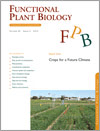
FUNCTIONAL PLANT BIOLOGY
Scope & Guideline
Exploring the Frontiers of Agronomy and Ecology
Introduction
Aims and Scopes
- Plant Stress Responses:
The journal presents research on how plants respond to abiotic and biotic stresses, including drought, salinity, heat, and pathogen attacks. This includes physiological adaptations, molecular pathways, and genetic factors influencing stress tolerance. - Photosynthesis and Metabolism:
A core focus is on understanding the mechanisms of photosynthesis and related metabolic processes, including the regulation of photosynthetic efficiency under varying environmental conditions. - Genomic and Molecular Studies:
The journal emphasizes genomic and molecular analyses to uncover the genetic basis of traits related to stress tolerance, growth, and development in various plant species. - Ecophysiology:
Research on plant ecophysiology explores how plants interact with their environment, including studies on water relations, nutrient uptake, and the impact of climate change on plant performance. - Biotechnology and Plant Improvement:
The journal also covers studies on biotechnological approaches, such as genome editing and genetic engineering, aimed at improving plant resilience and productivity.
Trending and Emerging
- Nanotechnology in Plant Science:
An increasing number of studies explore the use of nanomaterials, such as nanoparticles, to enhance plant growth and stress tolerance, indicating a trend towards innovative solutions for agricultural challenges. - Omics Approaches:
There is a significant rise in the application of transcriptomics, proteomics, and metabolomics to dissect complex plant responses to environmental stresses, showcasing a trend towards high-throughput and integrative approaches. - Climate Change Adaptation:
Research focusing on plant adaptation mechanisms to climate change, including studies on heat and drought tolerance, is becoming more prominent as global environmental changes pose new challenges. - Plant-Microbe Interactions:
There is a growing interest in understanding how plants interact with their microbial communities, particularly in relation to stress resilience and nutrient acquisition. - Functional Genomics:
Emerging studies are increasingly utilizing functional genomics to explore gene functions related to stress responses and plant development, reflecting a trend towards understanding the molecular basis of traits.
Declining or Waning
- Traditional Breeding Techniques:
Research focused on conventional plant breeding methods is less frequently published, as there is a growing emphasis on molecular and biotechnological approaches for crop improvement. - Basic Plant Morphology:
Studies concentrating solely on descriptive morphology or anatomy without linking to physiological or ecological implications have seen a decrease, as the field shifts towards integrative and functional studies. - Single-Species Studies:
There is a noticeable decline in research that focuses exclusively on a single plant species without comparative or ecological context, as multidisciplinary and comparative approaches gain favor.
Similar Journals
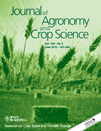
JOURNAL OF AGRONOMY AND CROP SCIENCE
Pioneering insights for a sustainable agricultural future.JOURNAL OF AGRONOMY AND CROP SCIENCE, published by Wiley, stands as a leading platform in the fields of agronomy and crop science, reflecting its commitment to advancing knowledge through rigorous research. With an impressive H-index that signifies its scholarly impact, this journal has consistently maintained a prestigious Q1 ranking in both Agronomy and Crop Science, and Plant Science as of 2023. With a robust ranking of #46/516 in Plant Science and #39/406 in Agronomy and Crop Science according to Scopus, it sits comfortably within the top percentiles, emphasizing its relevance and authority in the academic community. The journal has been a vital resource since its inception in 1973, with ongoing coverage until 2024, making it an essential reference for researchers, professionals, and students looking to navigate the latest developments and insights in crop management and agricultural practices. Although it does not currently offer open access options, JOURNAL OF AGRONOMY AND CROP SCIENCE remains committed to providing high-quality, peer-reviewed content that fosters innovation and encourages sustainable solutions within the agronomy sector.

Molecular Horticulture
Bridging Molecular Biology and Horticultural ExcellenceMolecular Horticulture is a prestigious journal published by SpringerNature, dedicated to advancing knowledge in the fields of Agronomy, Crop Science, Horticulture, and Molecular Biology. Based in the United Kingdom, this journal, with ISSN 2730-9401, is recognized for its high-quality, peer-reviewed research and has rapidly established itself within the academic community, achieving a remarkable Q1 ranking across its relevant categories as of 2023. With a strong focus on innovative research that explores the intersection of molecular biology and horticultural science, Molecular Horticulture provides valuable insights that are essential for researchers and professionals aiming to enhance crop production and sustainability practices. As part of the Scopus database, the journal ranks impressively within its fields, holding notable positions such as Rank #7 in Horticulture and Rank #42 in Agronomy and Crop Science. While currently published through traditional access models, the journal remains accessible to a wide audience of scientists, educators, and students eager to stay informed on the latest discoveries and trends in plant science.

BIOLOGIA PLANTARUM
Fostering Collaboration in Plant Science ExcellenceBIOLOGIA PLANTARUM, esteemed within the realms of horticulture and plant science, is a leading academic journal published by the Academy of Sciences of the Czech Republic, Institute of Experimental Botany. Established in 1959, this journal showcases innovative research and advancements in plant biology, focusing on a spectrum of topics including plant physiology, genetics, and biotechnology. With an impressive Scopus ranking in Horticulture (Rank #41/115) and Plant Science (Rank #221/516), it holds a significant place in the academic community, reflected in its Q2 and Q3 status within its respective categories. Although it is not open access, authors are encouraged to contribute to the growing body of knowledge that supports sustainable practices in agriculture and horticulture. Published in the Netherlands, BIOLOGIA PLANTARUM continues to foster collaboration and dialogue among researchers, professionals, and students dedicated to understanding and advancing plant sciences.
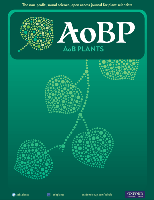
AoB Plants
Advancing plant science through open access.AoB Plants is a distinguished open-access journal published by Oxford University Press, dedicated to advancing the field of plant science. Since its inception in 2009, this journal has played a pivotal role in disseminating high-quality research that encompasses a wide range of topics including plant biology, ecology, and biotechnology. With an impressive impact factor and a ranking in the Q1 quartile for Plant Science, AoB Plants is recognized for its innovative contributions and scholarly rigor, ranking #129 out of 516 in the Scopus Agricultural and Biological Sciences category, placing it in the 75th percentile among its peers. By promoting open-access availability of research findings, the journal empowers researchers and practitioners alike, facilitating greater collaboration and knowledge sharing in the global scientific community. Situated in the heart of the United Kingdom, AoB Plants continues its commitment to providing a platform for pioneering research and developments in plant science, thus fostering a deeper understanding of the crucial roles that plants play in our ecosystems and economies.

RUSSIAN JOURNAL OF PLANT PHYSIOLOGY
Exploring the Depths of Plant PhysiologyRUSSIAN JOURNAL OF PLANT PHYSIOLOGY, an esteemed publication with ISSN 1021-4437 and E-ISSN 1608-3407, is dedicated to advancing knowledge in the field of plant science. Published by PLEIADES PUBLISHING INC in the United States, this journal serves as a critical platform for researchers, professionals, and students aiming to explore the intricacies of plant physiology, biochemistry, and environmental interactions. With a consistent output from 1996 to 2024, the journal holds a commendable position within the academic community, reflected in its Q3 ranking among 516 journals in the Plant Science category (2023) and a competitive 44th percentile ranking in the Scopus database. Although the journal is not Open Access, it continues to attract a diverse readership of scholars eager to publish groundbreaking research. It stands out as a vital resource for anyone engaged in understanding the physiological processes that underpin plant life, thereby contributing to global agricultural advancements and ecological sustainability.
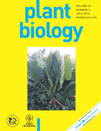
PLANT BIOLOGY
Unveiling the Secrets of Plant EcologyPLANT BIOLOGY is a prestigious academic journal published by Wiley, dedicated to advancing knowledge in the fields of plant science, ecology, and evolutionary biology. With an impressive impact factor and ranking in the Q1 category for Ecology, Evolution, Behavior and Systematics, and Plant Science as of 2023, it stands at the forefront of research dissemination. The journal encompasses a broad scope of plant biology topics, providing a critical platform for researchers to share innovative findings and foster interdisciplinary collaboration. Available in both print (ISSN: 1435-8603) and online formats (E-ISSN: 1438-8677), it ensures accessibility through open access options. As a crucial resource for professionals, researchers, and students alike, PLANT BIOLOGY cultivates a deeper understanding of plant systems and their ecological significance, making it an essential addition to the library of anyone dedicated to the study of biology and the environment.

Tropical Plant Biology
Connecting Researchers to Tropical BiodiversityTropical Plant Biology is a premier academic journal published by Springer, dedicated to advancing the understanding of tropical plants and their ecological significance. With an ISSN of 1935-9756 and an E-ISSN of 1935-9764, this journal serves as a vital platform for researchers, professionals, and students focused on the fields of Genetics and Plant Science. Notably recognized in 2023 as a Q2 journal in Plant Science and Q3 in Genetics, it ranks 171st out of 516 in Agricultural and Biological Sciences and 227th out of 347 in Genetics according to Scopus. The journal encompasses a diverse range of topics, offering insights into tropical plant biology, ecology, conservation, and biodiversity. Although it does not currently operate under an open-access model, it remains an essential resource for anyone passionate about tropical ecosystems and their intricate relationships. With contributions spanning from 2009 to 2024, Tropical Plant Biology continues to foster scholarly discourse and innovation in the field.
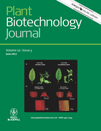
PLANT BIOTECHNOLOGY JOURNAL
Leading the way in plant science research and collaboration.Plant Biotechnology Journal, published by Wiley, is a premier open-access platform dedicated to advancing the field of plant biotechnology. Since its inception in 2003, this journal has played a pivotal role in disseminating high-quality research that enhances our understanding of plant genomics, biochemistry, and molecular biology. With an impressive impact factor and a prominent position in Q1 quartiles across Agronomy, Crop Science, Biotechnology, and Plant Science, it ranks among the top journals globally, reflecting its significant influence in the agricultural and biological sciences. Researchers and professionals can access cutting-edge studies and reviews that facilitate innovation in sustainable crop production and biotechnology applications. The journal's transition to an open access model since 2016 has further amplified its reach, ensuring that vital research is available to a global audience, promoting collaboration and knowledge sharing within the scientific community.

CANADIAN JOURNAL OF PLANT SCIENCE
Advancing the Frontiers of Plant ResearchCanadian Journal of Plant Science (ISSN: 0008-4220, E-ISSN: 1918-1833) is a prestigious publication dedicated to advancing research in the fields of agronomy, horticulture, and plant science. Published by Canadian Science Publishing, this journal has been a cornerstone in the Canadian and international scientific community since its inception in 1973. With a solid presence in reputable databases, it ranks in the Q3 category for multiple disciplines as of 2023, reflecting its impact and relevance within the agricultural sciences. The journal serves as a vital resource for researchers, professionals, and students, encouraging the dissemination of innovative findings and fostering collaboration across disciplines. Although it is not an open-access journal, subscribers gain exclusive access to a wealth of knowledge, with articles aiming to enhance the understanding of plant systems and contribute to sustainable agricultural practices. The Canadian Journal of Plant Science remains committed to supporting the growth of plant-related research and its practical applications in today's changing environmental landscape.
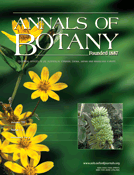
ANNALS OF BOTANY
Exploring the Depths of Plant Science Since 1887ANNALS OF BOTANY, published by Oxford University Press, stands as a leading journal in the field of Plant Science, with a distinguished history that dates back to 1887. This esteemed journal, recognized for its contribution to the advancement of botanical research, holds a prestigious Q1 quartile ranking in its category as of 2023. With a commitment to sharing high-quality, peer-reviewed research, ANNALS OF BOTANY provides a vital platform for researchers, professionals, and students to disseminate novel findings and engage in scholarly discourse. Although it does not currently offer open access options, the journal remains accessible to a wide academic audience, further cementing its role in facilitating the exchange of knowledge within the global botanical community. For those interested in the dynamic and evolving world of plant sciences, ANNALS OF BOTANY is an indispensable resource.